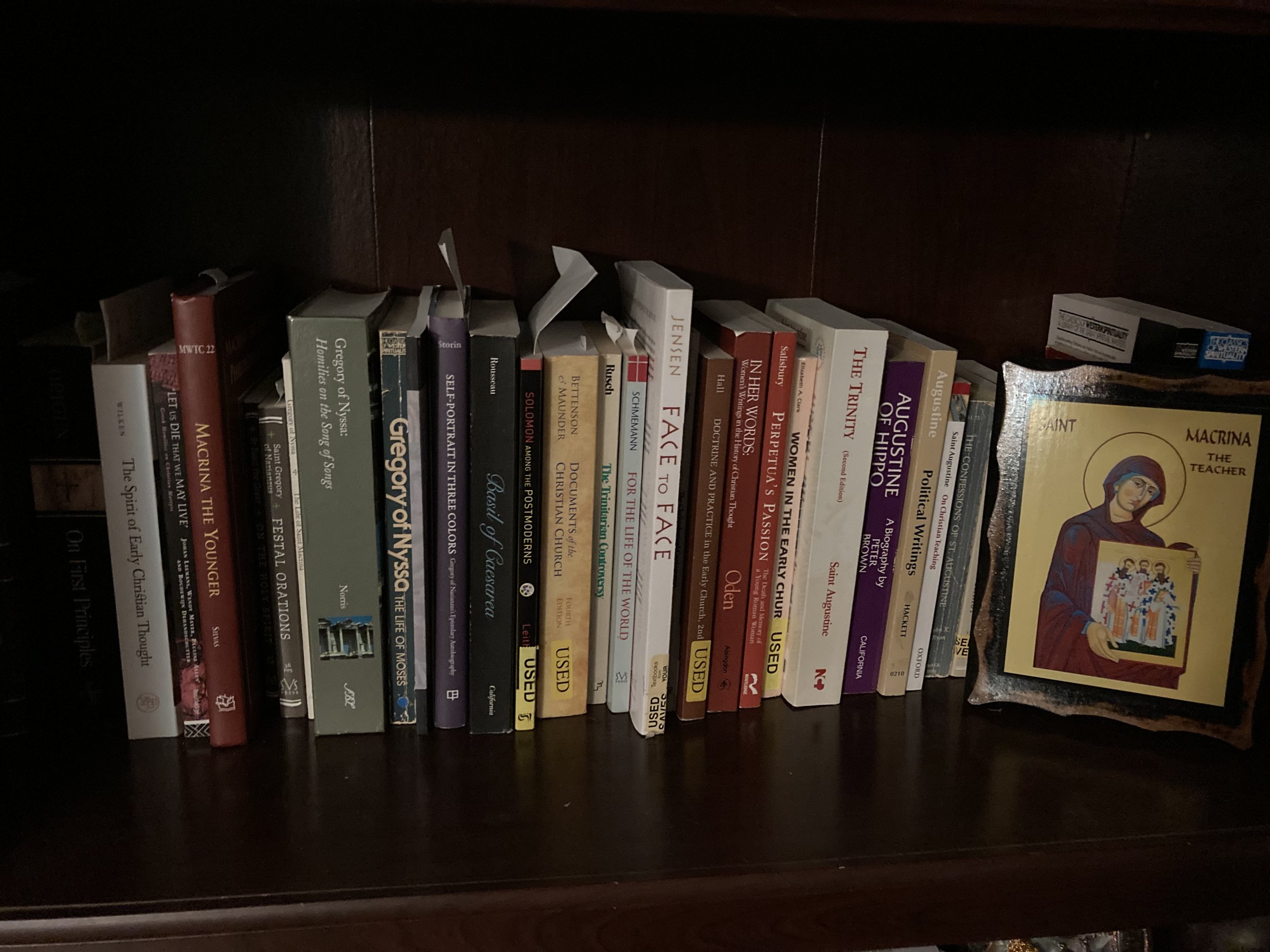Rule of Thirds
The writer in her lair.
11 September 2022
Writing ideas come to me (Leah) with an array of personalities. Some are shy. They give the tiniest hint of their existence and then retreat, waiting for me to coax them out with long periods of staring quietly into the middle distance. Others are elusive, beckoning me to follow through the dark until I stub my toe on whatever it is I need to know. And then there are the assertive ones. They walk into my brain like they own the place, commanding my attention before they’ve bothered to introduce themselves.
I am very important, they announce.
Ok, but who are you? There might be a hovering sense of significance, or a phrase with a certain inexplicable heft.
Yes, I’m Very Important.
I’ve learned to roll with it. They’re never quick to explain themselves, but ideas that come with that much self-possession have vital work to do. Writing about Macrina seized me like that: a conviction that far outstripped any idea of how I’d actually execute the process. That was in my last semester of undergrad. The structuring principle of the story came to me in the same building three years later.
It was January of 2020. The biggest cloud on my immediate horizon was that I’d probably bitten off more than I could chew in my second semester of grad school, taking Trinity and Christology, World Christianity, Historiography and an independent study. Together they would require more than seventy pages’ worth of research papers, most of which came due in the same two weeks. It would take lockdown and pandemic-related extensions to get it all done.
But that was all far beyond my view on this sunny January morning. My independent study was about Macrina the Younger, of course, and I’d climbed to the early Christian reading room on the fifth floor to peruse a dissertation titled “Chastely I Live for Thee: Virginity as Bondage and Freedom in Origen of Alexandria, Methodius of Olympus, and Gregory of Nyssa.”
(The world of early Christian monasticism is vastly more interesting than you might think, painted with desire as much as renunciation and riddled with questions of poetry and power. It is also far more complicated than this post will allow. But Gregory of Nyssa was one of Macrina’s little brothers and her chief biographer, and I was interested in what the dissertation would reveal.)
The idea walked in early on. I was reading about Origen’s commentary on the Song of Songs when the author mentioned the pedagogy of Solomon. Proverbs, Ecclesiastes and the Song of Songs were all received as Solomon’s writings, and many in the early church understood them as a coherent curriculum. You start with Proverbs to gain a basic instruction in wisdom. Then comes Ecclesiastes with its questioning of appearances, the harrowing of what you thought you knew. After that, finally, is the invitation into love.
I am very important, this ordering announced.
That was obvious enough. How much saner would youth group be if it started with sober instruction in wisdom instead of Passionate Everything and vague love songs? Maybe then doubt could be held as the next step toward maturity. Maybe the journey could end in clear-eyed love rather than the choice between rigidity or total deconstruction.
Yes, but I am very important to your novel, the idea insisted.
I took reams of notes for my independent study paper, but I can’t say if I wrote that thought down. I might not have needed to. “Very important” soon became “structurally important.” I wasn’t doing much creative writing that semester, but it lodged in my mind that the movement from wisdom to doubt to love was the shape to tell Macrina’s story. Proverbs, Ecclesiastes, Song of Songs. A second independent study class gave me space to begin a fourth draft. (It was the first to have actual chapters and some idea of where it wanted to go.) I wrote through fall and spring, through long Covid and Easter and graduation. The first third of the story was Proverbs-shaped, seven chapters long.
I wrote through a summer with friends and an autumn of gardening with elementary-school students. Ecclesiastes drew to a close at seven chapters, too. The symmetry would please any rational soul of the Greco-Roman world. Love and resurrection were more daunting than doubt, but on a Thursday four weeks into Lent, I finished chapter 21 and knew the draft complete.
A snapshot of the writer’s bookshelf.


